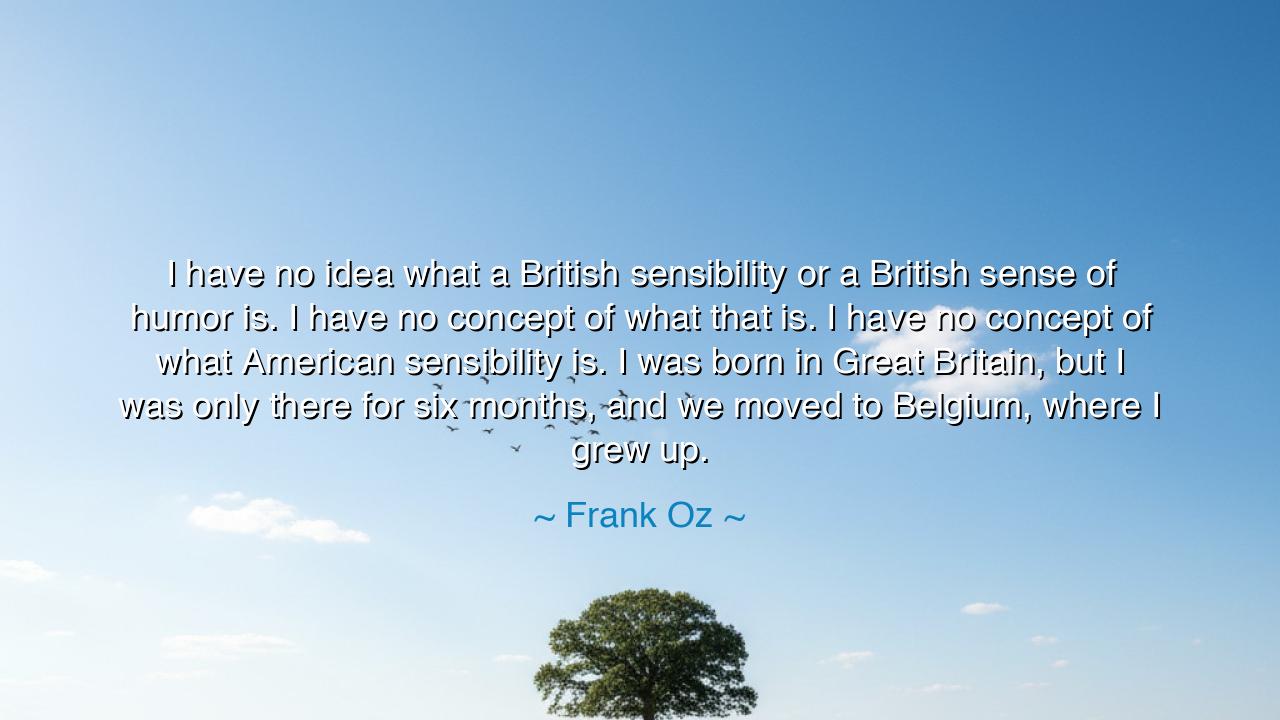
I have no idea what a British sensibility or a British sense of
I have no idea what a British sensibility or a British sense of humor is. I have no concept of what that is. I have no concept of what American sensibility is. I was born in Great Britain, but I was only there for six months, and we moved to Belgium, where I grew up.






When Frank Oz declared, “I have no idea what a British sensibility or a British sense of humor is. I have no concept of what that is. I have no concept of what American sensibility is. I was born in Great Britain, but I was only there for six months, and we moved to Belgium, where I grew up,” he spoke not merely about nationality or humor, but about the mystery of identity itself. His words echo a truth that transcends geography and art—the truth that the soul belongs not to a single land, but to the vastness of experience. In this statement, there is both humility and revelation: the acknowledgment that the deepest parts of who we are cannot be neatly contained by labels, nor confined within the borders of nations.
The origin of this reflection lies in Oz’s own life, a life lived between cultures and languages, between belonging and observation. Born in England to parents who had fled war-torn Europe, he spent his childhood in Belgium before moving to the United States, where he would become one of the most influential creators in modern entertainment. As the man behind the voices and movements of Yoda, Miss Piggy, Grover, and countless beloved characters of The Muppets and Sesame Street, Oz learned early that human truth is universal—it transcends accent, custom, or national pride. When he claims to have “no concept of British or American sensibility,” he is not denying culture; he is transcending it. He is saying, in essence, that the truest artistic sensibility is not tied to any one tribe, but to the shared heart of humanity itself.
To speak of humor in this light is to speak of the soul’s laughter—the recognition that we are all absurdly human. What some call “British wit” or “American humor” are merely dialects of the same eternal language: the joy and irony of existence. Oz, who learned to make both children and adults laugh through puppets and film, understands that laughter does not belong to nations; it belongs to truth. When Kermit hesitates, when Yoda speaks in riddles, when Miss Piggy asserts herself with impossible glamour, the humor we feel is not cultural—it is human. It springs from the shared frailty and wonder of being alive. The great humorist, like the great philosopher, speaks to what unites rather than divides.
In this, Frank Oz resembles the ancient storytellers who wandered between kingdoms, carrying myths from one people to another. They, too, belonged to no single homeland, yet their tales were embraced by all. Consider Aesop, the Greek slave whose fables became eternal wisdom in every language. Though born in bondage, he spoke truths that kings repeated; though rooted in Greece, his stories found a home across continents. Like Aesop, Oz reminds us that art is the homeland of the rootless—the sanctuary of those who live between worlds. The artist who has no single identity can speak to every identity, for he belongs to them all.
There is also in Oz’s words a quiet wisdom about perspective. To be detached from one cultural identity is not to be lost—it is to see more clearly. The one who stands between two worlds can see both their virtues and their follies. He can laugh at what others take too seriously, and weep where others remain blind. The ancients called such a person a citizen of the world—one whose loyalty is not to a flag, but to truth itself. In this way, Oz’s humor, his creativity, and his humility are all born from that same place of in-between—the place where empathy grows.
Yet there is also a subtle lesson in belonging here. Many people spend their lives searching for a place to fit, yearning for a clear identity, a home that defines them. But Oz’s words teach the opposite truth: that to create, to grow, to understand, one must sometimes live without borders. To be “from everywhere and nowhere” is not a curse—it is a calling. The artist, the thinker, the dreamer—each must learn to be a bridge. When Oz admits he has “no concept” of these sensibilities, he is acknowledging the freedom of the unbounded mind. He reminds us that wisdom does not come from knowing where we are from, but from understanding who we are becoming.
So, let this be the lesson drawn from Frank Oz’s reflection: identity is not a cage—it is a journey. Do not let your birthplace define your soul, nor your culture dictate your heart. Seek to understand all people, for in doing so, you will understand yourself. Let your humor, your art, and your compassion cross borders. Laugh not as an Englishman or an American, but as a human being. Speak not with the voice of one nation, but with the voice of truth, which belongs to none and to all.
And so, remember these words as both comfort and challenge: the one who does not fully belong to any single world may, in time, come to belong to them all. Like Frank Oz, live between worlds—between laughter and reflection, between art and understanding. For there, in that sacred space beyond boundaries, you will find what is most enduring: the shared rhythm of humanity, beating in every heart, regardless of the flag it flies.






AAdministratorAdministrator
Welcome, honored guests. Please leave a comment, we will respond soon